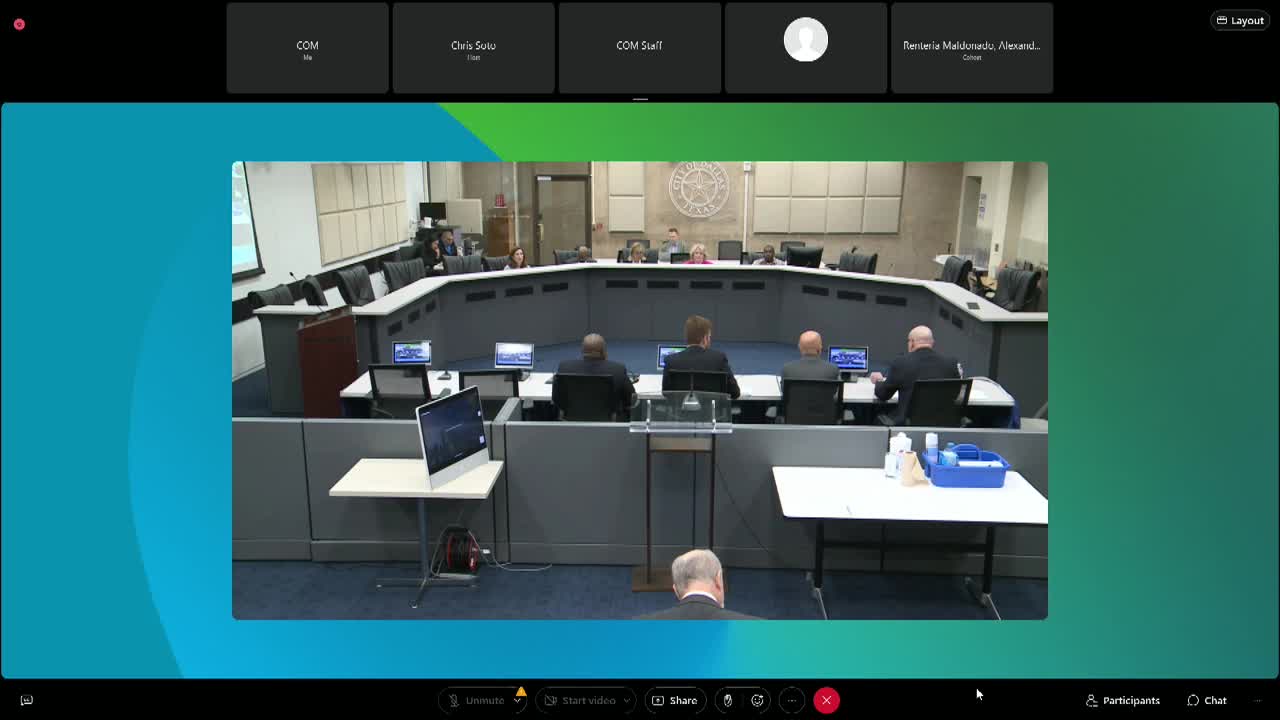Dallas committee adds limited law‑enforcement status for inspector general to legislative agenda
Get AI-powered insights, summaries, and transcripts
Subscribe
Summary
The City of Dallas Legislative Affairs Ad Hoc Committee voted unanimously to add a request for limited law‑enforcement status for the Office of Inspector General to the city—s state legislative priorities, following presentations on fraud losses, restitution programs and information‑sharing limits.
The City of Dallas Legislative Affairs Ad Hoc Committee voted unanimously Jan. 6 to add a request for limited law‑enforcement status for the city—s Office of Inspector General to the city—s state legislative agenda.
The committee action follows a presentation by Bart Beavers, interim inspector general, on recent federal and industry estimates of fraud and corruption losses and the investigative tools the office lacks domestically without law‑enforcement authority. "Fraud and corruption require the attention of people that address it. It needs three things: independence, law enforcement status and criminal jurisdiction," Beavers told the committee.
The change will be forwarded to full City Council as a "pursue" item in the council—s state legislative program, meaning city staff will actively seek a state bill or sponsor to carry the request in Austin.
Why it matters
Committee members, the interim inspector general and the Dallas District Attorney—s Office framed the proposal as a way to improve joint investigations, access federal asset‑sharing programs and secure restitution for the city when it is a criminal victim. Beavers and witnesses cited national estimates of fraud losses and explained how specific law‑enforcement powers would change current practice: "When you're investigating somebody, you want to look them up ... You need to know who you are investigating for a number of reasons," Beavers said, describing access to systems such as the FBI—s NCIC, criminal subpoenas, search warrants and grand‑jury access.
What presenters said
Beavers summarized reported fraud metrics from outside sources: the Association of Certified Fraud Examiners estimates fraud can equal about 5% of revenue while a Government Accountability Office range is 3%–7%. He noted median loss per reported case of about $145,000 and an average loss figure cited in his slide deck of about $1.7 million; he also said roughly 48% of reported cases include some component of corruption.
He described three practical benefits the office would gain with limited law‑enforcement status: (1) stronger information sharing and the ability to participate in multiagency task forces, (2) access to federal equitable sharing and asset‑forfeiture processes when the city is a criminal victim, and (3) the ability to seek court‑ordered restitution under state sentencing processes. "If you're signed up and you qualify, the feds will pay the money," Beavers said, offering examples from his prior work where federal participation generated compensation after prosecutions.
Dallas District Attorney John Creuzot, invited to comment, endorsed Beavers— outline and urged the council to consider the investigative gap the city faces when it relies on outside agencies: "If you are relying on some other agency to do your investigation, you're already at a disadvantage," Creuzot said, arguing an in‑house office with law‑enforcement tools can pursue cases more consistently and keep momentum on investigations.
Concerns and caveats raised by council members
Some council members supported the change as a logical next step after the office gained independence from the mayor—s office on the ballot last year; Beavers had noted voters approved the independence initiative by nearly 70%. But several members urged caution. Concerns included staffing, budgetary limits, whether investigators would be willing to meet law‑enforcement physical requirements (Beavers said 3 of 5 investigators indicated interest in participating while 2 of 5 said they did not want to carry firearms), and the risk that criminal work could reduce capacity for administrative ethics investigations.
Council members also pressed operational details: how long fraud investigations typically take (Beavers said complex cases can require at least 18 months to follow financial records), whether restitution or equitable sharing is available now without the change (Beavers said restitution can be ordered today if the city is named as a victim in a criminal prosecution, but having law‑enforcement status improves coordination and the city—s seat at the table), and whether the proposal would be premature before a permanent inspector general and full staffing are in place. Several council members asked staff to provide additional written detail on related legislative items in the broader state priorities list.
Formal action and next steps
The committee recorded two formal actions. At the start of the meeting the committee approved minutes from the Aug. 27 ad hoc session by voice vote. Later, Council Member Scott Stewart moved to add "limited law‑enforcement status" for the Office of Inspector General to the city—s state legislative agenda under the "pursue" category; Council Member Cameron Atkins seconded. The chair called for the ayes and recorded the motion as approved unanimously. The committee directed staff to forward the change to full City Council for adoption as part of the city—s 2025 state legislative program.
Committee members asked staff to provide follow‑up materials to clarify related items in the legislative program, including how the IG request would interact with existing priorities and what resources would be needed if the state enacts the change.
Votes at a glance
- Motion to approve minutes of Aug. 27 ad hoc committee: voice vote recorded as unanimous. - Motion to add limited law‑enforcement status for the Office of Inspector General to the City of Dallas state legislative agenda (pursue): moved by Council Member Scott Stewart; seconded by Council Member Cameron Atkins; voice vote recorded as unanimous in committee. The item will be forwarded to full council for final adoption.
The committee continued a separate review of the broader state legislative program and discussed moving several items between "pursue," "support" and "monitor" categories; members asked staff for memos with more detail on grid reliability, rail safety, mental‑health/Medicaid issues and card‑room clarity before finalizing other changes.
